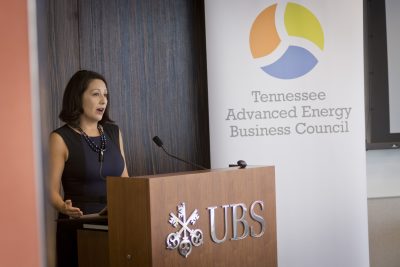By Jetta Wong, Senior Advisor at Los Angeles Cleantech Incubator
In 2007 the National Academy of Sciences released the seminal report, Rising Above the Gathering Storm, to Congress focused on how the United States needs a coordinated effort in science and technology to create high-quality jobs and solve some of our most pressing societal challenges. It stated that “Research sows the seeds of innovation. The influence of federally funded research in social advancement – in the creation of new industries and in the enhancement of old ones – is clearly established.”

Jetta Wong presenting at TAEBC’s Lunch and Learn.
While this enhancement has been clearly established, the process and ability to easily commercialize federally funded research has not been established. The federal government has an obligation, not to mention a congressional mandate, to see that federally funded R&D is utilized. Yet, so many of us that work in R&D know that the pre-commercial valley of death between early-stage R&D project to prototype, and then on to pilot demonstration is a valley too great for most scientists, engineers, startups or entrepreneurs to address on their own. They must look to additional federal funding, which may be drying up, or to the private sector to further develop their science project into a commercial product.
Luckily, the State of Tennessee and the federal government have been taking steps to support early-stage innovators and the commercialization of technologies. Building off of the great work that was going on in Tennessee through its REVV program and the New Mexico Small Business Assistance Program, the federal government launched an innovative pilot program called Small Business Vouchers. This was designed to increase small business access to DOE’s national labs to develop and prototype the small business’ technologies. SBV has held three rounds of selections, connecting 144 small businesses with 12 national labs for a total of $22 million taxpayer dollars.
 Yet, most startups have never even heard of a Department of Energy National Laboratory, let alone one of its great new programs. To better support startups and entrepreneurs, the Department of Energy also funded the Incubatenergy Network which is focused on accelerating the transition to a sustainable economy through national coordination of incubator resources supporting entrepreneurs focused on clean energy innovation and deployment. Organizations like Greentown Labs, Clean Energy Trust and many others help companies tap into a variety of resources, like the National Labs, that could help entrepreneurs bridge the early valley of death.
Yet, most startups have never even heard of a Department of Energy National Laboratory, let alone one of its great new programs. To better support startups and entrepreneurs, the Department of Energy also funded the Incubatenergy Network which is focused on accelerating the transition to a sustainable economy through national coordination of incubator resources supporting entrepreneurs focused on clean energy innovation and deployment. Organizations like Greentown Labs, Clean Energy Trust and many others help companies tap into a variety of resources, like the National Labs, that could help entrepreneurs bridge the early valley of death.
The Los Angeles Cleantech Incubator (LACI) is also one of those organizations. It is focused on creating an inclusive green economy. It was started in 2011 by the City of Los Angeles and has grown to be the hub of cleantech innovation in the whole region. It supports 40+ portfolio companies, which also benefit from the strong community of pro bono advisors and resources provided through LACI’s network. One way that LACI is helping to close the pre-commercial valley of death is by developing a scalable method to make low-cost microloans to early-stage hardware companies. It is focused on expanding investment from U.S. banks and Community Development Financial Institutions’ (CDFIs) into early-stage cleantech companies. This will help open up critical working capital to companies that are positioned for growth, but do not have access to traditional loans.
Other cities, like the City of Fremont California, are also in the game of early-stage innovation. In July of this year, the Fremont City Council approved a contract to develop a feasibility study for an innovation center on a plot of land owned by the City, adjacent to its new public transportation hub and across the street from Tesla’s assembly facility. LACI will lead a multi-disciplinary team to conduct this analysis. Fremont has a history of innovation, especially in manufacturing, and is at the cross-section between significant investor dollars, strategic R&D companies, advanced manufacturing, and strong universities and national laboratories. Solving the early-stage finance and resource gap for startups may be the critical component that Fremont and other cities can catalyze to grow their community’s innovation ecosystem.
